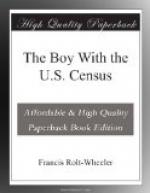“There are plenty of schools in the mountains now, aren’t there?” asked Hamilton. “It must be very different here, Uncle Eli, from what it was when you were a boy.”
“Thar has been quite a change, an’ the change is comin’ faster now. But thar’s still a lot o’ folk who a’nt altered a bit sence the war. You city people call us slow-movin’ up hyeh, an’ as long as thar’s any o’ the ol’ spirit abroad thar’s a chance o’ trouble. If yo’ really are goin’ in for this census-takin’, I’d keep clar o’ the mount’ns.”
“You really would?” queried the boy thoughtfully.
“An’ what’s more,” continued his Uncle, “I would jes’ as soon that yo’ didn’ have anythin’ to do with it near hyeh. I don’ want to see any little differences between families, such as census-takin’ is likely to provoke.”
[Illustration: Taking the census in old Kentucky: Typical conditions of an enumerator’s work in the mountain districts. (Courtesy of Art Manufacturing Co., Amelia, O.)]
“Why, Uncle Eli!” cried Hamilton in amazement, “you talk as though the days of the feuds were not over.”
“Are yo’ sure they’re all over?” the Kentuckian said.
“I had supposed so,” the boy replied. “I thought the Kentucky ‘killings’ had stopped ten or fifteen years ago.”
“It’s a little queer yo’ sh’d bring that up today,” the old man said, “for I was jes’ readin’ in the paper some figures on that very thing. Yo’ like figures, this will jes’ suit you. Where was it now?” he continued, rustling the paper; then, a moment later, “Oh, yes, I have it.”
“‘During the terms of the last three Kentucky governors,’” he read, “’over thirteen hundred criminals have been pardoned, five hundred of them being for murder or manslaughter.’ It says fu’ther on,” the old man added, “that pardonin’ is jes’ as frequent now as it ever was. I don’ believe it is, myself, but if thar is such a lot o’ pardonin’ goin’ on for shootin’, thar must have been a powerful lot o’ shootin’.”
“But that’s for all the State,” objected the boy, “not for the mountains only. That must be for crimes in the cities and all sorts of things. You can’t make the feuds responsible for those.”
“Not altogether,” the mountaineer agreed, “the real ol’-time feud is peterin’ out, an’ it’s mainly due to the schoolin’. The young folks ain’t ready fo’ revenge now, an’ that sort o’ swings the women around. An’ up hyeh in the mount’ns, same as everywhar else, I reckon, the idees o’ the women make a pile o’ difference.”
“But I should have thought the women would always have been against the feuds,” said Hamilton.
“Yo’d think so, but they weren’t. They helped to keep up the grudges a whole lot.”
“Aunt Ab hasn’t changed much,” volunteered the lad.
“She hasn’t for a fact. Ab is powerful sot. She holds the grudge against the Howkles in the ol’ style. But the feelin’ is dyin’ out fast, an’ soon it’ll be like history,—only jes’ read of in books.”




